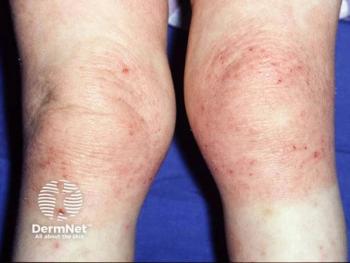
Etrasimod Demonstrates New Safety, Efficacy Data for AD in Phase 2 Study
A study presented at the American Academy of Dermatology Virtual Meeting Experience 2021 exhibited new safety and efficacy data for etrasimod as a potential treatment for atopic dermatitis.
Etrasimod (APD334, Arena Pharmaceuticals) may disrupt multiple pathways that cause acute and chronic disease phases of atopic dermatitis (AD) by changing sphingosine 1-phosphate receptor 1 (S1p1). Emma Guttman-Yassky, MD, PhD, the Sol and Clara Kest professor of dermatology and vice chair for research at the department of dermatology at the Icahn School of Medicine at Mount Sinai Medical Center, New York City, New York, presented the results from the ADVISE (NCT04162769) study at the American Academy of Dermatology Virtual Meeting Experience 2021 (AAD VMX 2021).1
Etrasimod is a once-daily, oral S1P1,4,5 modulator with investigation underway in multiple phase 3 trails for moderate to severe ulcerative colitis (UC). It is also being studied for other immune-mediated inflammatory conditions such as alopecia areata, eosinophilic esophagitis, and Crohn’s disease.
The phase 2, 12-week, placebo-controlled trial was the first to evaluate the S1P receptor modulation as a potential mechanism for treatment of patients with atopic dermatitis (AD). Its objective is to assess the safety and efficacy of etrasimod in patients with moderate to severe AD.
The study enrolled 140 participants across the United States, Canada, and Australia with a 1:1:1 randomization. The inclusion criteria were comprised of male and female participants 18 to 70 years of age, having an Eczema Area and Severity Index (EASI) score of at least 16, a validated Investigator Global Assessment (vIGA) score of 3 or more and a body surface area (BSA) of 10% or more.
The patients were split into 3 treatment arms: etrasimod 1 mg, etrasimod 2 mg, or placebo. After 12 weeks of treatment, there was a follow up visit at Week 16. At that point, patients were enrolled in an ongoing 52-week open-label extension study that will end with a follow up again at Week 72.
The primary endpoint was the percent change in EASI score from baseline to Week 12. The key secondary endpoint was the proportion of participants with a vIGA score of 0 or 1, defined as clear or almost clear, and decrease from baseline of at least 2 points at Week 12. Client reported outcomes contained the percent change in weekly Peak Pruritus Numerical Rating Scale (NRS) at Week 12, the change in Dermatology Life Quality Index (DLQI) and changes in the Patient-Oriented Eczema Measure (POEM) from baseline to Week 12.
“In terms of demographics, there were highly balanced groups, but I want to point out that the vast majority of patients were moderate, not severe patients,” Guttman-Yassky said.
The proportion of participants achieving vIGA at Week 12 was 13% of placebo, 14.9% etrasimod 1 mg, and 29.8% etrasimod 2 mg. Similar results were seen in the weekly pruritus NRS data with 27% placebo, 32.5% etrasimod 1 mg, and 42.1% of the etrasimod 2 mg group achieving a 4-point or greater improvement at Week 12.
In terms of DLQI scores, the etrasimod 2 mg group performed best with more than 85% achieving a 4-point improvement, followed by 82.9% etrasimod 1 mg and 64.1% placebo at Week 12. POEM scores were different, with 80% of the etrasimod 1 mg group achieving a 4-point improvement, followed by 73% etrasimod 2 mg, and 43.6% placebo.
There were 8 Grade 1 through 3 treatment emergent adverse events (TEAEs) of lymphocyte decrease in the etrasimod groups: one in the 1 mg and 7 in the 2 mg group. Lymphocyte count decrease is an on-target effect of etrasimod and the means by which the investigational drug potentially confers therapeutic benefit, according to Guttman-Yassky.
The safety data exhibited adverse events (AEs) that affected more than 5% in any treatment group. AEs included nausea, constipation, urinary tract infection, back pain, dizziness, headache, and atopic dermatitis. No serious adverse events (SAEs) were observed.
In conclusion, etrasimod 2 mg improved both patient and clinician assessed outcomes at Week 12. The 2 mg treatment also had a greater proportion of participants who achieved an vIGA score of 0 or 1 and a DLQI and POEM improvement of 4 points or more at Week 12 compared to placebo. It was also well tolerated in patients with atopic dermatitis with consistent safety profiles to previous studies and no SAEs.
“These results support the rationale of S1p1 modulation as a potential new mechanism of action and oral treatment for patients with atopic dermatitis and I think this suggests it should be further investigated in a phase 3 clinical trials,” Guttman-Yassky said.
Disclosures:
Emma Guttman-Yassky has acted as a consultant for and received grants/honoraria from AbbVie; Anacor; Celgene; Celsus Therapeutics; Dermira; Galderma; Glenmark; Janssen Biotech; LEO Pharmaceuticals; MedImmune; Novartis; Pfizer; Regeneron Pharmaceuticals, Inc; Sanofi; Stiefel/GlaxoSmithKline; Vitae; Mitsubishi Tanabe; Eli Lilly & Co; Asana Biosciences; and Kiowa Kirin; has acted as an investigator for Celgene; Glenmark; LEO Pharmaceuticals; MedImmune; Regeneron Pharmaceuticals, Inc; and Eli Lilly & Co; and participated in advisory boards for Celgene; Celsus Therapeutics; Demira; Galderma; Glenmark’ MedImmune; Novaris; Pfizer; Regeneron Pharmaceuticals, Inc; Sanofi; Stiefel/GlaxoSmithKline; Vitae and Asana Biosciences.
Reference:
Guttman E. A Novel, Oral, Selective Sphingosine 1-Phosphate Receptor Modulator, Improves Patient and Clinician Reported Outcomes in Adults with Moderate-to-Severe Atopic Dermatitis in a Randomized, Double-Blind, Placebo-Controlled Phase 2 study (ADVISE). Presented at the: American Academy of Dermatology Virtual Meeting Experience 2021 (AAD VMX); Virtual.
Newsletter
Like what you’re reading? Subscribe to Dermatology Times for weekly updates on therapies, innovations, and real-world practice tips.











